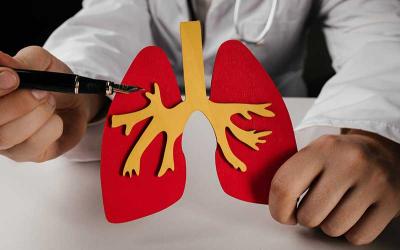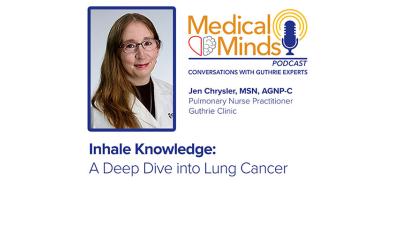Support and Excellent Care on Your Lung Cancer Journey
Being diagnosed with lung cancer can be overwhelming and scary. You and your family can rely on our support through your cancer journey.
Your team includes specialists from many areas working together who help patients just like you every day.
What is Lung Cancer?
Lung cancer starts when abnormal cells begin to grow out of control. These cells form a tumor. Lung cancers are grouped into two main types: small cell and non-small cell.
Lung cancer can spread to the lymph nodes or other organs in the body, such as the brain. Cancer that forms in one part of the body and then spreads to another is called metastatic cancer.
Symptoms of lung cancer can include:
- A new cough that won’t go away or worsens
- Chest pain
- Hoarse voice
- Wheezing
- Unexplained weight loss
- Coughing up blood
- Repeat or persistent infections such as bronchitis or pneumonia
Lung Cancer Screening for Smokers
Lung cancer can be present before symptoms occur. Cancer caught at this early stage is easier to treat. If you are a heavy smoker or were a heavy smoker who quit within the last 15 years, you may qualify for lung cancer screening.
Lung screening is done using low-dose CT. This test creates an image of the lungs so doctors are able to see small irregularities called nodules. This procedure is quick and safe and done without needles, incisions, or excessive radiation exposure.
Call 844-999-LUNG (844-999-5864) to find out if you qualify for lung cancer screening.
Lung Cancer Diagnosis
To determine if your symptoms are the result of lung cancer, doctors need to look at cells in a lab to confirm. Cells can be taken from:
- Mucus that is coughed up
- Fluid removed from the area around the lung (thoracentesis)
- Tissue from the suspicious area removed using a needle or surgery (biopsy)
If lung cancer is found it is important to know if it has spread in the body. The extent of the disease affects your treatment plan. This may require more tests.
You may also have a pulmonary (lung) function test (PFT) to see how well your lungs are working.
Lung Cancer Treatment
Guthrie offers lung cancer treatment options including:
- Cryoablation
- Chemotherapy
- Endobronchial ultrasound-guided bronchoscopy
- Radiofrequency ablation
- Thermal ablation
- Video-assisted thoracoscopic surgery (VATS)
Lung Cancer Care at Guthrie
- Board-certified specialists– Your team of doctors at Guthrie include specially trained pulmonologists, thoracic surgeons, and radiation and medical oncologists
- Multidisciplinary conference – doctors and providers from across specialties discuss every patient and organize the best treatment for her or him across the system
- Nurse navigators assist you with navigating the health care journey and understanding your diagnosis. They also lend emotional support. We have general cancer navigators and navigators for lung and breast cancer.
- Social workers help you and your family with emotions and give support. They also help identify community resources that can be helpful.
- Financial advocates help you understand bills and, when necessary, find resources to help you pay them.
- Clinical trials – Guthrie Clinical Research offers you treatment options not available in most hospitals.





